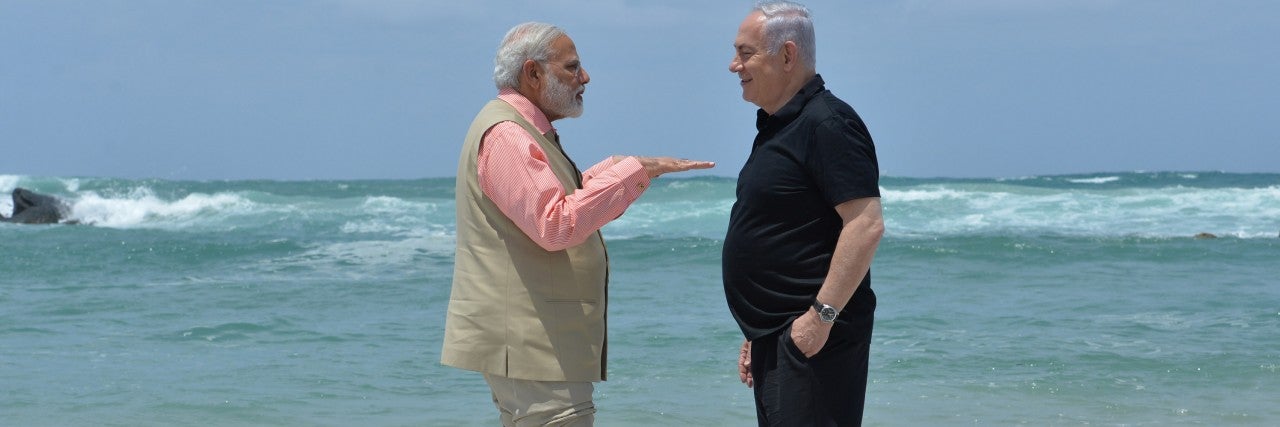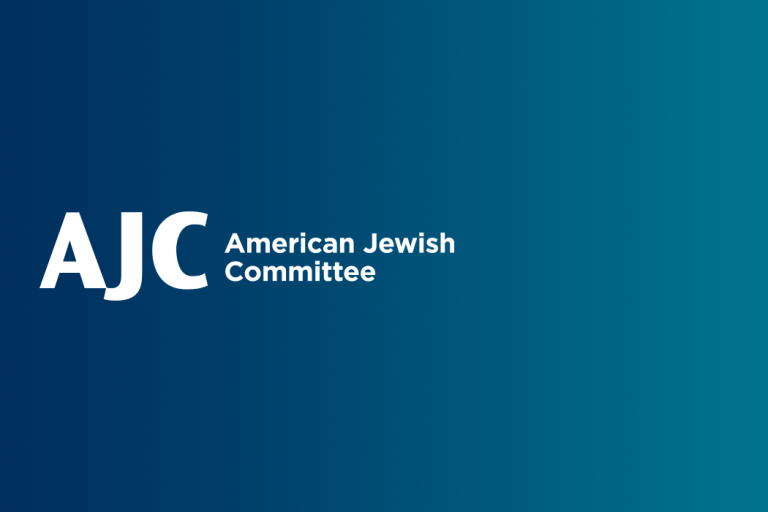January 12, 2018 — New Dehli, India
By Arjun Hardas, AJC India Representative
At a time of international tensions, the diplomatic relationship between Israeli Prime Minister Benjamin Netanyahu and Indian Prime Minister Narendra Modi is a breath of minty fresh air—and a pragmatic model for bilateral foreign policy.
It’s also a ton of fun to watch.
Relations between the two countries go back to 1950, when India recognized Israel, and shortly afterward an Israeli consulate opened in Mumbai (then Bombay). The relationship became warmer still in 1992, when India opened an embassy in Tel Aviv. A quarter century later in 2017 Netanyahu and Modi stood together and pushed their toes into the sand at an Israeli beach while announcing a new round of agreements.
Though Modi and Netanyahu had met before, the three-day trip to Israel in July was historic nonetheless because it marked the first time an Indian premier visited the Jewish state while in office. The highly publicized event served as a coming-out party of sorts for the prime ministers—a late bar mitzvah—who were celebrating a new range of technological, academic, agricultural, defense, and economic partnerships—as well as their budding friendship. One photo series in particular, distributed by the Israeli Ministry of Foreign Affairs, shows Netanyahu and Modi gleefully interacting on a Mediterranean beach during a demonstration of an Israeli mobile desalination unit - one example of their innovation partnership. (Water conservation and purification, a process at which Israel excels, is a priority for Modi in India.). And guess what Netanyahu is bringing for Modi as an early Valentine’s gift? The very same jeep (or rather its fraternal twin!).
Observers took note of the obvious mutual affection between the leaders—towards the end of the trip, Modi gave Netanyahu a picture of the two of them on the beach, and there was lots of embracing—prompting some to deem their relationship a “bromance.” The Internet had its say too, turning their sunny interactions into a meme-fueled mini-phenomenon that only served to magnify the legend of their saunter along the Israeli shore.
In the past, they’ve even exchanged pleasantries about Hanukkah and the Indian festival of lights, Diwali, in their native languages.
The week of January 14, Netanyahu is returning the favor, embarking with a delegation on a five-day trip to India. We should expect more business and bonhomie. The day Netanyahu arrives coincides with the end of Uttarayan, a massive kite festival and public holiday that’s celebrated in Gujarat, the western Indian state where Modi, head of the BJP party, served as chief minister before being sworn in as prime minister. And that was where AJC, which has maintained a representative in India for more than 20 years, first met with Modi.
The jocular yet businesslike nature of the Netanyahu-Modi relationship is surely welcome, especially since Israel is sometimes portrayed in a negative light by some Indian groups.
There are about 5,000 Jews living in India today out of a total population of over 1.3 billion. Mumbai is home to India’s largest Jewish community, about 3,500 people. Israeli Jews of Indian origin currently living in Israel number 80,000. “The Jewish community in India was always welcomed with warmth and respect and never faced any persecution,” wrote Netanyahu and Modi in a joint statement last July. “The Jews of Indian origin in Israel are proud of their heritage and have left an indelible imprint on both societies. Both communities serve as a human bridge between our nations.”
To be sure, relations between Israel and India are not perfect, especially at the UN. Even so, it was in New York, during the 2014 UN General Assembly session, that the Bibi-Modi friendship began to bloom. Just four months after Modi was elected, the two leaders met privately—the first time in over a decade that prime ministers from both countries had met—and the Indian premier also met privately with American Jewish leaders, including a large AJC delegation. Just a couple of months before, the Indian government had rejected a proposed resolution to condemn Israel during the Gaza conflict. Then, in 2015, in a departure from its previous voting pattern, India abstained from voting on an anti-Israel resolution at the UN Human Rights Council regarding the Gaza conflict.
This week in India, expect Netanyahu and Modi to release kites high into the Indian sky, a symbol of prosperity. Chances are, their India meetings will be as colorful and productive as their time together in Israel. MAZAL TOV and CELEBRATE!! The Shidduch is surely on!!
Photo Source: Israeli Foreign Ministry


